Civil Society Association for Law Enforcement Systems (CISST) executive board member Berivan Korkut has said health is the most critical issue in overcrowded Turkish prisons, the Mezopotamya news website reported on Wednesday.
Korkut has been receiving dozens of letters from inmates that describe conditions in prison.
According to a report sent by the Justice Ministry to the Turkish Parliament, as of Sept. 15, 2018, there were 246,426 prisoners in 449 prisons with a capacity for 211,274 inmates. The constant increase of inmates has led to confined living spaces and an exacerbated violation of rights.
“It takes months to get to a hospital. Thirty prisoners share a 12-person ward. Due to inadequate beds, detainees take turns sleeping. In some jails, there are beds on the floor in front of the bathroom entrance. The overcrowding is a significant issue in going out for social activities, meeting with a psychologist and for exercising one’s rights.” Korkut said.
Political detainees can be transferred to three different prisons in a year, Korkut said. There are families who live far away and have a seriously ill member, yet such circumstances are not considered in those transfers. “Therefore, both the family and the inmate is punished,” Korkut adds.
Another issue is lack of books. According to Korkut books sent by inmate’s families are not accepted by the administration of most prisons, while they also reject books in foreign languages due to a lack of translators who could review the books’ compatibility with prison regulations.
Korkut said some prison administrations seize the diaries of inmates to examine them and that they arbitrarily refuse to convey petitions from prisoners seeking their rights to other institutions.
“A limited number of news stories have been published about rights abuses in prisons. People are uninterested in what is happening in cells. Some say that ‘in prison, these things happen’,” Korkut added.
According to official records, Turkey has investigated more than 600,000 people on terrorism charges since a controversial coup attempt in 2016, with measures against terrorism suspects becoming harsher.

